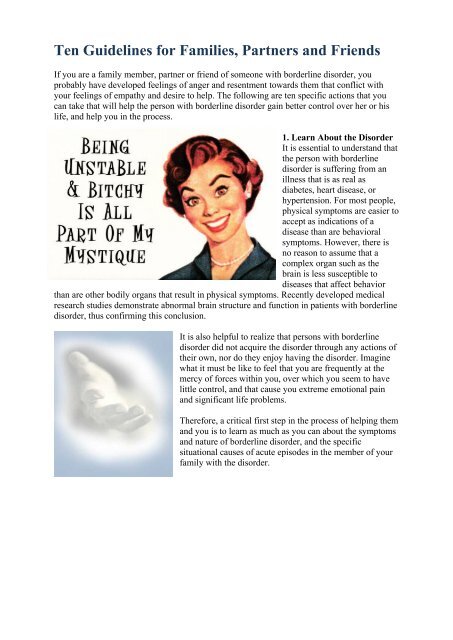Borderline - DEAN AMORY
Create successful ePaper yourself
Turn your PDF publications into a flip-book with our unique Google optimized e-Paper software.
Ten Guidelines for Families, Partners and Friends<br />
If you are a family member, partner or friend of someone with borderline disorder, you<br />
probably have developed feelings of anger and resentment towards them that conflict with<br />
your feelings of empathy and desire to help. The following are ten specific actions that you<br />
can take that will help the person with borderline disorder gain better control over her or his<br />
life, and help you in the process.<br />
1. Learn About the Disorder<br />
It is essential to understand that<br />
the person with borderline<br />
disorder is suffering from an<br />
illness that is as real as<br />
diabetes, heart disease, or<br />
hypertension. For most people,<br />
physical symptoms are easier to<br />
accept as indications of a<br />
disease than are behavioral<br />
symptoms. However, there is<br />
no reason to assume that a<br />
complex organ such as the<br />
brain is less susceptible to<br />
diseases that affect behavior<br />
than are other bodily organs that result in physical symptoms. Recently developed medical<br />
research studies demonstrate abnormal brain structure and function in patients with borderline<br />
disorder, thus confirming this conclusion.<br />
It is also helpful to realize that persons with borderline<br />
disorder did not acquire the disorder through any actions of<br />
their own, nor do they enjoy having the disorder. Imagine<br />
what it must be like to feel that you are frequently at the<br />
mercy of forces within you, over which you seem to have<br />
little control, and that cause you extreme emotional pain<br />
and significant life problems.<br />
Therefore, a critical first step in the process of helping them<br />
and you is to learn as much as you can about the symptoms<br />
and nature of borderline disorder, and the specific<br />
situational causes of acute episodes in the member of your<br />
family with the disorder.


















